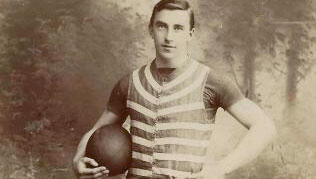Dedicated to all of our ANZACS.
It is impossible to put into words how grateful we, as proud Australians and New Zealanders are for the sacrifices you made for our freedom. Your bravery will be celebrated forever, our eternal heroes.
Football was a safe place. Funnily enough, it was a place where people escaped to. They escaped the hatred, the fighting, the fear of the unknown of war. It was 2 hours a week to feel something, other than consternation. Football was their freedom.
Football was an escape for those who lived through war. It was a way that family, friends, even strangers found peace within the picket fences that held their 2 hours of exuberance.
Throughout the Boer War, WW1 and WW2, the Korean War and the Vietnam War, hundreds of football players; true heroes, risked their lives to fight for our country, with many not returning home.
One of those heroes was Joe Henry Slater.
May 3rd, 1917, he was killed-in-action at Second Bullecourt, France.
Joe Slater was a Geelong champion who fought in WW1 over 100 years ago.
Born November 29, 1888 in Ballarat to Henry and Diana (nee Reynolds), his family moved to Geelong when he was a young boy.
Slater attended Geelong College from 1902 to 1905. He built a fine reputation as a strong athlete, and played 1st XVIII Football in his last two years of school.
He was picked up by Geelong in 1906 as a 17 year old, and played on the half back flank.
Slater was a strong mark overhead, with fantastic pace and efficient use of space. His versatility allowed him to move forward and across the centre, but his true ability lay as a defender.
He kicked 17 goals in his 108 game career, and represented the VFL twice. He was noted as one of the best players of his time.
Duty then called, and in 1909, Slater had been appointed Lieutenant in the Senior Cadet Battalion in Geelong. Six years later, in May 1915, he was sent to Gallipoli. Slater served and survived two years on the frontline in Gallipoli. His Battalion was then transferred to France.
While in France, he was promoted to the rank of Captain. In late 1916 he was appointed commander of a bombing school, taking control of a full bombing division. During this time, he was killed-in-action on the 3rd of May, 1917, in Bullecourt, France.
News of Slater’s death spread quickly through Geelong fans by word of mouth, on their way to a match at Corio Oval. Overwhelming grief filled the country town, at the loss of their home grown hero.
But more important than the loss of a footballer, was the loss of a family member.
It wasn’t just Slater’s immediate family who felt the grief, but everyone who watched him play and lived his football moments with him. They were HIS family too.
In 2001, Joe Henry Slater was selected on the half back flank in the Geelong Cats Team of the Century. This proves how much of an impact he had on the club during his time and how he is in our minds today.
Football can never be compared to war. War is the biggest sacrifice you can make as a person. It’s a harsh fear and extreme loneliness you face.
War is the trust put into your comrades and the risks taken to protect YOUR country.
War is the sacrifice to leave your family, friends and the life you have always known, to do something to defend OTHERS. It’s literally putting your life on the line.
Football is not even close to war. Football is a freedom we are gifted with. It’s a game where we can voice our opinions and emotions freely. It’s a game where we get so entranced by the moment that we forget about the world around us.
Football is our escape, from war, from things that don’t always make sense.
The least we can do, as free Australians, is make sure that our soldiers’ heroism and bravery lives on through the way we live our lives.
In memory of our Geelong footballers who made the ultimate sacrifice for their country.
Your spirit lives on… down at Kardinia Park.
Joseph ‘Alan’ Cordner: April 25, 1915, Gallipoli
Edward McLean: May 1915, Gallipoli
Joe Crowl: June 1915, Gallipoli
James Aitken: August 1915, Gallipoli
Bill Landy: July 1916, France
Arthur McKenzie: July 1916, France
Joe Slater: May 1917, France
Les James: October 1917, Belgium
John Bell: December 1917, Western Front
Ralph Lancaster: August 1942, New Guinea
Jim Knight: October 1943, Milne Bay
Clyde Hellmer: April 1945, New Guinea
Jack Lynch: September 1944, Charter Towers
*A total of 182 Geelong players served their country from the Boer War to the Vietnam War.


Leave A Comment